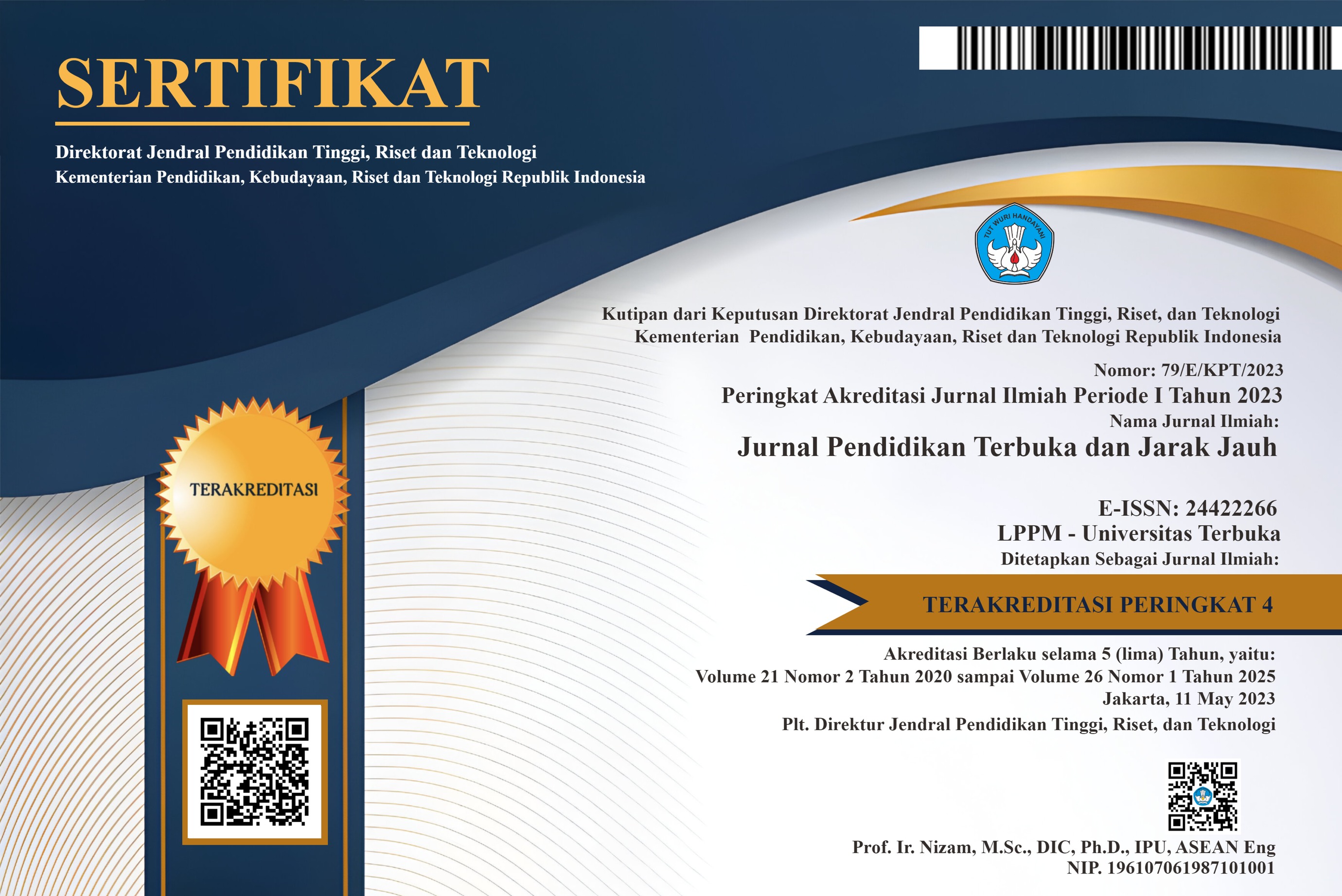MODAL SOSIAL DAN MODAL MANUSIA PADA PENDIDIKAN JARAK JAUH DI UNIVERSITAS TERBUKA
Keywords:
distance education, human capital, social capitalAbstract
This article discusses about distance education in the context of sosiological point of view. The discussion emphasizes on the concepts of social capital and human capital, especially, the role of distance education in contributing social capital and human capital in the society. It is also focuses about the contribution social capital and human capital in the distance education institution in Indonesia, that is the Universitas Terbuka. The discussion shows us that distance education institution has the role in improving the human capital that, then, force in increasing the social capital between the human who are involved in the society social network.
References
Darmayanti, T. (2006). Efektivitas intervensi keterampilan self-regulated learning dan keteladanan dalam meningkatkan kemampuan belajar mandiri dan prestasi belajar mahasiswa pendidikan jarak jauh. (Disertasi yang tidak dipublikasikan). Jakarta: Program Pasca Sarjana, Fakultas Psikologi, Universitas Indonesia.
Gordon, M. (1998). Human-capital theory: A dictionary of sociology. Diambil pada 10 Desember 2009, dari http://www.encyclopedia.com/doc/1O88-Humancapitaltheory.html
Keputusan Rektor. (2010). Kode Etik Di Lingkungan Universitas Terbuka. Keputusan Rektor No:769/H31/KEP/2010, tanggal 22 Maret 2010.
Mashud, M., Sutinah,. & Sudarso. (2010) BMP Sosiologi Pembangunan SOSI4311. Jakarta: Universitas Terbuka.
Moore, M. G., & Kearsley, G. (2005). Distance education: A systems view (2nd ed). Belmont, Calilfornia: Wadsworth Publishing Company.
Reimers-Hild, Connie I., Susan M. F., & James W. K. (2007). Entrepreneurial career development: using human capital, social capital, and distance education to achieve success. Diambil pada 30 Desember 2009, dari http://www.advancingwomen.com/awl/spring2007/reimers.htm
Setijadi. (1988). Indonesia: Universitas Terbuka. Prospects, 8 (2), 189-197.
Smith, M.K. (2000-2009). Social capital. Diambil pada 5 Januari 2010, dari http://www.infed.org/biblio/social_capital.htm
Universitas Indonesia. (2009). Profil staf dan mahasiswa Universitas Indonesia. Diambil pada 29 Maret 2010, dari http://www.ui.ac.id/id/profile/page/facts/staf-dan-mahasiswa.
Universitas Terbuka. (2010a). Katalog Universitas Terbuka 2010. Jakarta: Universitas Terbuka.
Universitas Terbuka. (2010b). Rencana Strategis 2010-2021, Rencana Operasional 2010-2013 Universitas Terbuka. Jakarta: Universitas Terbuka.
Widodo, S. (2008). Kelembagaan, kapital sosial, dan pembangunan. Diambil pada 8 Desember 2009, dari http://learning-of.slametwidodo.com/2008/02/01/kelembagaan-kapital-sosial-dan-pembangunan/
Wikipedia. (2008). Kapital Sosial. Diambil pada 8 Desember 2009, dari http://id.wikipedia.org/wiki/Kapital_sosial
Wikipedia. (2009). Human Capital. Diambil pada 7 Desember 2009, dari http://en.wikipedia.org/wiki/Human_capital
Xiao, J. (2001). Determinants of salary growth in Shenzhen, China: An analysis of formal education, on-the-job training, and adult education with a three-level model. Diambil pada 7 Desember 2009, dari http://www.tc.columbia.edu/centers/coce/pdf_files/d4.pdf





